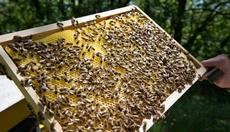Honey found to contain life-threatening pesticides to humans and bees
09 Oct 2017
Three-quarters of the honey produced around the world has been shown to contain nerve agent pesticides that can harm bees and pose a potential toxic hazard to humans.
 | |
| Simon Rowell Photography |
In the study, scientists who tested 198 honey samples from every continent except Antarctica found that 75 per cent were laced with at least one of the neonicotinoid chemicals.
Over two-fifths of the honey tested contained two or more varieties of the pesticides and 10 per cent held residues from four or five.
Environmental campaigners have called for a "complete and permanent" ban preventing any further use of neonicotinoids on farm crops in Europe.
Experts called the findings "alarming", "sobering" and a "serious environmental concern" while stressing that the pesticide residue levels found in honey generally fell well below the safe limits for human consumption.
However, according to one leading UK scientist, it is impossible to predict what the long term effects of consuming honey containing tiny amounts of the chemicals might be.
Dave Goulson, professor of Biology at the University of Sussex, said, "Beyond doubt ... anyone regularly eating honey is likely to be getting a small dose of mixed neurotoxins.
"In terms of acute toxicity, this certainly won't kill them and is unlikely to do measurable harm. What we don't know is whether there are long-term, chronic effects from life-time exposure to a cocktail of these and other pesticides in our honey and most other foods."
For practical reasons it was "impossible to do a proper experiment to test this", he added.
The authors believe though, people who eat honey need not worry.
"It is well below the limit so I think it is not a major public health concern," author Dr Alexandre Aebi from the University of Neuchatel in Switzerland, told BBC News.
"We would have to eat an awful lot of honey and other contaminated products to see an effect, but I think it's a warning and it is a call for a precautionary principle. Neonicotinoids have just been shown to be endocrine perturbators for honey bees, so who knows?"
(Read more: Honey samples worldwide test positive for neonicotinoids)


















